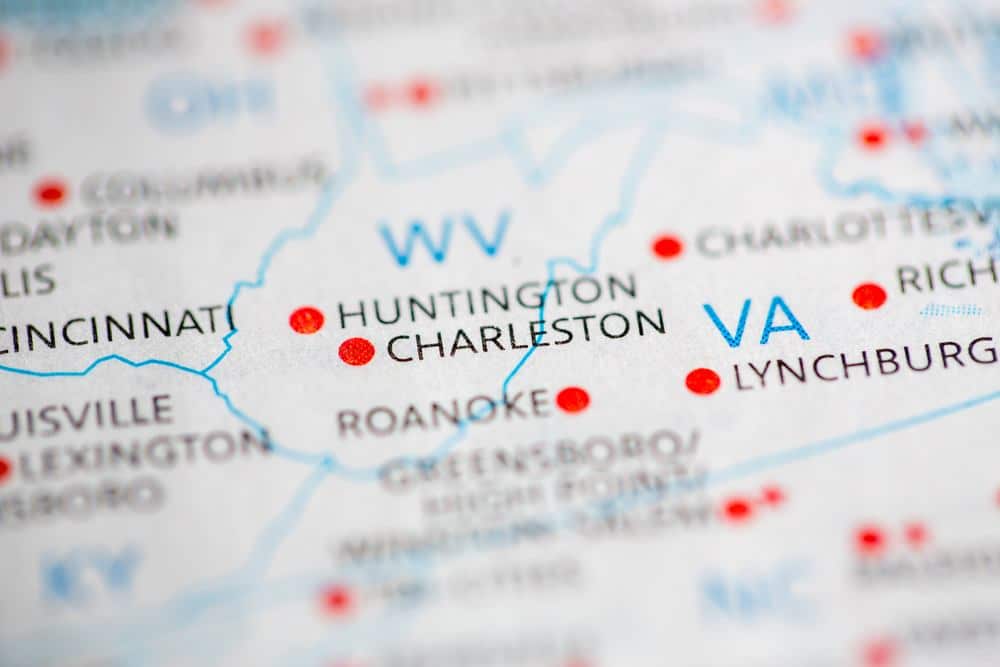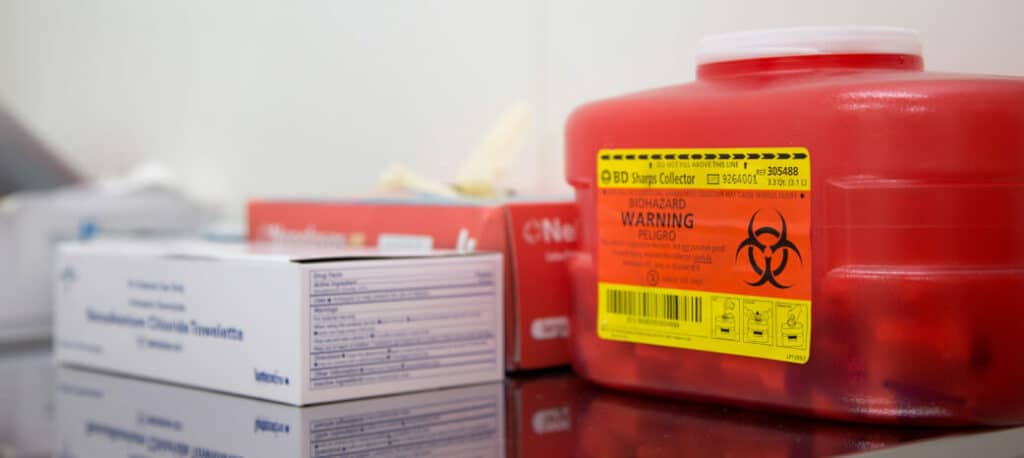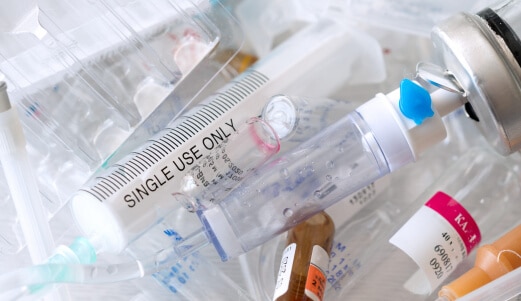
West Virginia Medical Waste Disposal
Annual Savings offered by MedPro Disposal in West Virginia
See below for some of our West Virginia quotes, saving West Virginia Practices thousands of dollars.
The MedPro Disposal Difference
Safe medical waste disposal has never been so simple and affordable. How do we keep our prices so low? By charging only for the services you need and keeping our operating costs low to pass along the savings.
Every practice is different, and we tailor a custom solution that fits your needs and budget, from our pick-up schedule to the right kinds of biohazard and sharps containers.
Find out how much you can save instantly. Try our online savings calculator.
West Virginia Locations Serviced
We offer biohazard and medical waste disposal services throughout West Virginia, including:
It’s Easy to Get Started With MedPro Disposal

Contact Us
Contact MedPro Disposal for a fast, free medical waste removal quote. We’ll get to know you, discuss your needs, and settle on a number. You may be surprised at how much you can save on medical waste disposal with MedPro Disposal.

Waste Pickup Date
Work with MedPro Disposal to determine your first pickup date. We’ll confirm your office hours and provide convenient options for medical waste and sharps pickup.

Compliance Survey
Complete a compliance survey. After we get to know your requirements, we’ll send you a survey to identify any areas that need to be brought up to OSHA standards.
All three steps occur at no additional cost to your practice. You’re on your way to safe, affordable, compliant medical waste removal!
Contact MedPro Disposal Today for a Fast, Free Quote!
West Virginia Medical Waste Savings
| Practice Type | Zip Code | Projected Annual Savings |
|---|---|---|
| Health Center | 26801 | $8,160 |
| Oncologist | 25801 | $31,200 |
| Ambulance Service | 25801 | $18,180 |
| Nursing Home | 26134 | $6,912 |
| Family Practice | 26208 | $8,115 |
| Police Department | 25301 | $5,250 |
Find Out How Much You Can Save Instantly
Try our on-line savings calculator.


Terrain has been a major factor in the development of the state of West Virginia. Karst topography is a landscape formed by the dissolution of soluble rocks such as limestone, gypsum and dolomite. West Virginia’s karstic topography has made it a unique region for recreational caving and scientific research; its karst lands cool the rivers to create excellent trout fishing.
The development of its profuse natural resources, such as munitions from its saltpeter caves, limestone quarries, salt mining, and especially coal mining, have built not only industry and finance in the state, but also labor unions as a result of this rugged and dangerous work. Ecological and mining safety are still on the table today, as West Virginia exports its coal to the power plants of local states.
The Appalachian Mountains rise and fall in West Virginia, where country roads do take you home, as famously sung about by John Denver. The Appalachian Trail, stretching from Georgia to Maine, passes through the state and mainly through the town of Harpers Ferry, the historic site of Civil War battles. Harpers Ferry was the site of John Brown’s raid. Brown was a radical in his day, an abolitionist who believed only armed insurrection would end black slavery. He led a raid against the federal armory there with a multi-racial group. Jailed, sentenced to treason and hung, the controversial Brown’s raid nevertheless had a profound emotional effect on the country and the start of the Civil War.
Wild and wonderful, as its motto calls West Virginia, the state is almost entirely mountainous, among the oldest on earth, full of rich biodiversity and abundant for outdoor recreation. Though the state has struggled economically in recent years and faces challenges for its labor force, many of its people still refer to West Virginia as “almost heaven”.
To help West Virginia stay wild and wonderful, the State’s Department of Health and Human Resources has an Infectious Medical Waste Program that manages medical waste and its disposal, to ensure the protection of public health, safety and welfare, and of the amazing environment in West Virginia.
West Virginia Medical Waste Disposal

Here, a classification defines infectious medical waste as medical waste which is capable of producing an infectious disease. Medical waste shall be considered capable of producing an infectious disease if it has been, or is likely to have been, contaminated by an organism likely to be pathogenic to healthy humans, if such organism is not routinely and freely available in the community, and such organism has a significant probability of being present in sufficient quantities and with sufficient virulence to transmit disease.
Types of waste include:
- Cultures and stock of microorganisms and biologicals
- Blood and Blood Products
- Pathological Wastes
- Sharps
- Animal Carcasses, Body Parts, Bedding and Related Wastes
- Isolation Wastes
- Class 4 Viral Agents: Any residue or contaminated soil, water, or other debris resulting from the cleanup of a spill of any infectious medical waste; and Waste contaminated by or mixed with infectious medical waste.
For storage of medical waste, rules state in summary that it shall not be stored onsite for more than thirty days, shall be stored at or near the point of pickup or treatment in a manner that maintains the integrity of the containers (prevents leakage, provides protection from water, rain, and wind). The storage area shall be: constructed of easily cleanable, impermeable, durable materials, the floor shall not be carpeted or have open seams, and floor drains must discharge to a sanitary sewer disposal system. Storage areas must be kept clean and in good repair, have access control to prohibit unauthorized entry, and be posted with the international biohazard symbol.
Medical facilities have policies and procedures in place to ensure that medical wastes are properly handled, treated, and disposed of. As long as these systems are functioning properly, medical waste does not affect the public. The West Virginia Infectious Medical Waste Program performs inspections of transport vehicles used to haul waste in West Virginia, annual inspections of all of West Virginia’s large quantity generators (facilities generating in excess of fifty pounds of infectious medical waste per month), and monthly inspections of the treatment facility. These inspections assist facilities in ensuring that their procedures are operating correctly and provides a means to facilitate changes and updates to infectious medical waste procedures. The West Virginia Department of Environmental Protection also promotes compliance by providing assistance and/or enforcing regulatory requirements of hazardous waste generators and hazardous waste treatment, storage and disposal facilities. OHSA rules also impact various aspects of medical waste treatment, storage and disposal.
All of these government entities are performing the important function of overseeing and regulating compliance, in the best interests of public health and safety. Your health care facility is doing the same thing. Services that can assist you include medical waste disposal, biohazard removal, how to deal with sharps and expired RX pharmaceuticals, mail back programs for smaller facilities, and suites of safety compliance solutions, that include full-service training, tip, quick start and frequently asked question guides of diverse medical waste disposal topics, and infographics and advice about medical waste and its disposal, and how to save money and still get the job done thoroughly and safely. You will want your medical staff thoroughly trained on regulations compliance and daily operations. Protection is important, especially for insurance coverage and OHSA guidance, with easy accessibility to training certification, manifests, and compliance documentation. You will also want to get the services you sign up for. That means no hidden costs or fees, and customized service pricing that fits the needs of your health care facility, large, medium or small. Your choice of a medical waste disposal company in West Virginia is important, and will have a big impact on the quality of health care you provide to your customers. A dedicated MedPro Disposal professional is a phone call away, ready to answer your questions, and navigate the terrain of medical waste disposal management and operations with our friendly, convenient and comprehensive services.
West Virginia State Resources
West Virginia Department of Health and Human Resources

One Davis Square, Suite 100 Charleston, WV 25301

West Virginia Department of Environmental Protection

601 57th Street SE Charleston, WV 25304

West Virginia Little-Known Facts
The first federal prison exclusively for women in the U.S. was the Federal Industrial Institution for Women, in Alderson. Previous inmates include: Lolita Lebron, who opened fire on the House of Representatives chamber in 1954; Lynette Fromme who attempted to assassinate President Ford; and Martha Stewart, the celebrity homemaker convicted of lying to investigators about a stock sale.
West Virginia Online Safety Compliance Portal
We strive to provide you services in West Virginia that will save you money! Part of this process is to make sure you are not paying for more than you generate.
We understand the importance of saving your money without sacrificing service. MedPro will be your partner in your medical waste management program by being a low-cost provider of medical waste disposal and OSHA training services.
Have questions about compliant biohazard waste and sharps waste disposal best practices?
Why Choose MedPro Disposal for Medical Waste & Sharps Container Disposal in West Virginia?
Methods of West Virginia Medical Waste Disposal
On-site Medical Waste Collection
Package medical waste on-site, then leave it for collection by a medical waste disposal company.
Mailback Waste Disposal
Properly package and label the sharps, then send the biohazardous waste safely through the mail for disposal.






